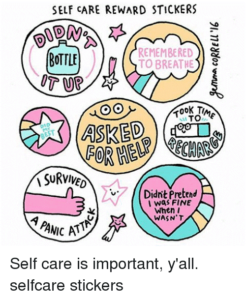Self-care is an important part of therapeutic work life to avoid or reduce the symptoms of Compassion Fatigue. Signs of compassion fatigue include difficulty concentrating, intrusive imagery, loss of hope, exhaustion and irritability. It can also include increased cynicism at work and clinical errors. Although we are posting this in OT (Occupational Therapy) month, this is not exclusive to this field. It can include therapists in all genres, doctors, nurses, therapeutic entrepreneurs, social workers and care givers.
Here are some tips that can help turn that fatigue into satisfaction.
- Work/Life demands inventory
Take stock of all the demands on your time and energy, including factors at home, work, volunteering and family. Once the list is complete, look at it. Determine what could be taken away, what could be delegated to someone else, what could be changed. Sharing this list with partners in the workplace and at home may help as well.
- Self-care Idea Collection
This is something you can do at work and at home. Develop a list of activities that you can do that are all about you. Asking co-workers or family for their input is helpful and may turn into some fun when they suggest something you never even thought of.
- Re-balance the workload at home and at work
Making time to fit those activities in could be what inhibits you from self-care at the moment. Do you work through your lunch? Do you ensure the dishes are done each night? Those are times you could be doing a nourishing activity. This can be achieved by delegating tasks. Do not expect others to read your mind, delegate someone else to do the dishes while you sit with a tea (or wine!!) and watch your favourite show, read a book or go for a walk.
- Transitioning from work to home.
Develop a way to transition to home life when you leave your workplace. Whether that is playing podcasts on the drive home, stopping at the gym or even just having a ritual when you get home by changing out of “work clothes” and embracing the calm (or chaos!!) that is home life.
- Exercise and take care of yourself.
Lunch time is a great time to take time for yourself. Take 30 minutes to go for a walk, book a 30 min massage or mani/pedi, or go to the gym. Some small offices will hire a private yoga instructor to come in for a 30 min easy yoga stretch. As long as you find an activity that increases blood flow and feels good then it will be of some good benefit.

One small change in your daily routine will have large results in the long run. Increases in those activities will become habits and you will begin to wonder how you coped before.
Ask for help, take the help and then go look after yourself.
Self-care is not self-indulgent. Self-care is self-respect.
Heather Yates, B.Sc. Nursing
Clinical Care Advisor


Recent Comments